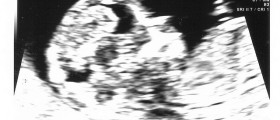
A miscarriage is end of pregnancy that occurs spontaneously before the fetus can survive. It is also called spontaneous abortion. Miscarriage is common and most often occurs before the 12th week of pregnancy. It happens in 20% of all recognized pregnancies while in many cases, it occurs when a woman was not even aware of being pregnant.Types of Miscarriage
Miscarriage is a process that may be of different types and have different stages. A threatened miscarriage is a medical term that refers to any vaginal bleeding that occurs in early pregnancy. It is usually accompanied by mild pain and cramping but the cervix remains closed. This type results from implantation of the fertilized egg and pregnancy usually continues.
On the other hand, inevitable miscarriage is vaginal bleeding with the open cervix, meaning the pregnancy is lost. Abdominal and back pain is also present and the bleeding is more severe.
Incomplete miscarriage is accompanied by heavy vaginal bleeding, abdominal pain, cramping and open cervix. However, some tissues still remain in the uterus.
Complete miscarriage means that the embryo or products of conception have been completely expelled from the womb. There is also vaginal bleeding, abdominal pain and cramping, but it subsides quickly. An ultrasound test shows an empty uterus.
Missed miscarriage means the pregnancy is lost but a woman may not be aware of this event. In this type of miscarriage the embryo dies but there is no bleeding and the products of conception remain inside the womb. Missed miscarriage can be recognized by loss of pregnancy symptoms and confirmed by ultrasound that shows absence of fetal cardiac activity.
Recurrent miscarriage refers to loss of three or more pregnancies in a row. This is rare and affects one in every 100 couples.
Blighted ovum or anembryonic pregnancy is a pregnancy in which the fertilized egg implants in the uterine wall but development of the fetus never starts as there is no placenta.
Ectopic pregnancy occurs when a fertilized egg implants in the fallopian tube, ovary or any other place except the uterus. Ectopic pregnancy requires prompt treatment due to possible severe maternal complications.
Molar pregnancy is caused by genetic error in the fertilization process resulting in development of abnormal tissue in the uterus. However, molar pregnancy is accompanied by common signs of pregnancy such as missed period, positive pregnancy test and nausea.
Prevention of MiscarriageThere is always a risk of miscarriage with every pregnancy. It cannot be prevented but there are ways to reduce this risk. Before trying to conceive, a woman should have healthy, balanced diet. Folic acid should be taken on a daily basis. Losing excess weight, regular exercising, avoiding alcohol and cigarettes is also recommended.
When pregnancy occurs, it is important to get prenatal care as well as to follow advice of a health care provider. The woman should avoid being around smoke, limit caffeine intake, avoid activities that carry the risk of injuries and avoid infectious diseases.
- www.nhs.uk/conditions/miscarriage/prevention/
- www.who.int/elena/titles/review_summaries/vitamins-miscarriage/en/
- Photo courtesy of Konstantinos Koukopoulos by Flickr: www.flickr.com/photos/86261473@N00/4805646514/

















Your thoughts on this
Loading...